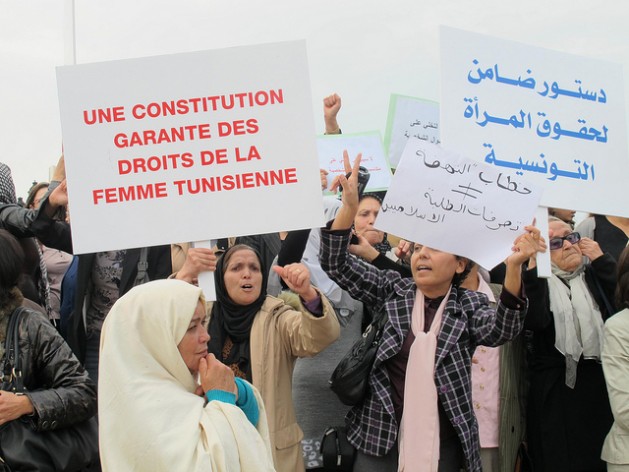
Women protest in Tunis to demand protection of their rights. Credit:
Women Still Walk Two Steps Behind in Arab World - Inter Press Service
UNITED NATIONS, Mar 6 2014 (IPS) -
In much of the Arab world, women’s participation in the labour force is
the lowest in the world, according to the United Nations, while women
in politics are a rare breed both in the Middle East and North Africa.
Perhaps one of the few exceptions is Algeria, says Lakshmi Puri, deputy executive director of U.N. Women.
"There is no doubt that culture and religion play some role, but the fact
remains that over the past 30 years, and particularly in the last
decade, we have seen the rising tide of very conservative forces in the
region." -- Sanam Anderlini
The North African nation has reached the critical mass of some 30
percent of women parliamentarians, while Saudi Arabia has broken new
ground by welcoming women to the Shura council.
Still, with a regional average of female parliamentarians just above
12 percent, the Arab world remains far behind the already low global
average of 20 percent, according to U.N figures. Asked whether this was due to cultural or religious factors, Puri told IPS, “It is not easy to pinpoint a single cause for the low level
of women’s participation in the labour force and in politics in the Arab
world, and more generally, around the world.”
She said there is no doubt that entrenched gender stereotypes and
social norms that condone discrimination against women play a negative
role, but other factors also need to be taken into account.
These include, for example, access to and quality of education,
opportunities to reconcile professional or political life with family
responsibilities, the overall structure of the labour market, and
prevalence of violence against women.
When representatives of women’s organisations meet in New York next
week, one of the many issues before the U.N. Commission on the Status of
Women (CSW) will be the low level of women’s participation in the
labour force and in political and social life worldwide.
The CSW, scheduled to hold its annual sessions Mar. 10-21, is the
primary inter-governmental policy-making body on gender equality and
advancement of women. This year’s session will focus on challenges and achievements in the
implementation of the U.N.’s Millennium Development Goals (MDGs),
specifically for women and girls.
Sanam Anderlini, co-founder of the International Civil Society Action
Network (ICAN) and a senior fellow at the Center for International
Studies at the Massachusetts Institute of Technology (MIT), told IPS:
“We should steer clear of assuming that the low levels of participation
in public spaces – political and economic – are ‘entrenched ‘cultural or
religious values.
“There is no doubt that culture and religion play some role, but the
fact remains that over the past 30 years, and particularly in the last
decade, we have seen the rising tide of very conservative forces in the
region – largely supported by regional governments themselves – that are
promoting a regressive agenda towards women.” Let’s not forget that Egypt had a feminist movement in the 19th century, she added.
Puri listed several factors that negatively affect outcomes for women and girls.
These, she pointed out, include family codes and parallel traditional
legal and justice systems that deny women property and inheritance
rights, access to productive resources, sanction polygamy and early and
child marriages, and put women at a disadvantage in marriage and
divorce.
At the same time, it is essential to tackle negative
misinterpretations of religion or culture that not only condone but
perpetuate myths about inherent inequality between men and women and
justify gender-based discrimination.
“As we at UN Women have pointed out, along with many faith-based and
other organisations, equality between women and men was propounded
centuries ago in the Arab region,” Puri said.
At the same time, governments along with all stakeholders, including
civil society, need to put in place an enabling environment in order to
increase women’s participation in all spheres of life, said Puri
Anderlini told IPS that in the Arab world – like any other part of
the world – there are always different cultural forces at play
simultaneously: conservative and progressive. But in the Arab world, the conservative forces are seeking to erase or discredit the gains made in the past.
“They like to associate ‘women’s rights’ with immorality and
westernisation. It is a clear political agenda that is being fomented
and we must not fall for the notion that it is ‘cultural’ or
religious’,” said Anderlini, who was appointed last year to the Working
Group on Gender and Inclusion of the Sustainable Development Network for
the U.N.’s post-2015 economic agenda.
She also said Islam calls for equal rights to education for women and
men – to equal pay, to women’s rights to inheritance and participation
in public life.
“What’s being spread are extreme interpretations of Islam that may be
rooted in countries like Saudi Arabia but are newer to Egypt, Tunisia
or Lebanon,” she warned. Asked how women’s participation can be advanced in the Arab region,
Puri told IPS, “As elsewhere, achieving the advancement of women’s
participation in the political, economic and social spheres in the Arab
States requires interventions at multiple levels.”
First, a reform of state constitutions and laws as well as of
traditional legal and justice systems and the creation of a conducive
policy environment based on international women’s rights norms and
instruments, such as the Convention to Eliminate All Forms of
Discrimination Against Women (CEDAW) and the 1995 Beijing Platform for
Action, needs to be in place.
This environment should not only allow, but also encourage women to participate in the work force and in public life.



